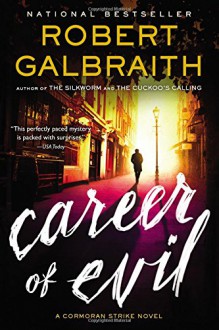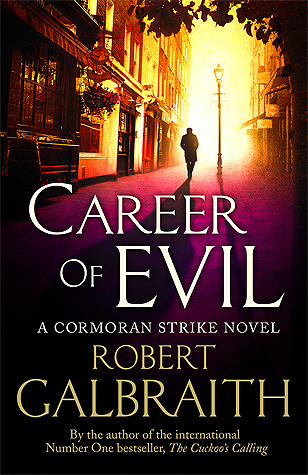When I received my copy of Lethal White last week, it reminded me of Order of Phoenix. I was 16 years old when I read Order of Phoenix and oh man, was I tired after reading all night long. The fourth part of the Cormoran Strike series, Lethal White is also excessively long (JKR did it again) but don't let that put you off as I found it the best of the CS books.

This review contains spoilers. You have been warned.
Picking up directly from where Career of Evil left off, the novel shows Strike and his former assistant turned salaried partner Robin falling into an uneasy rhythm following her marriage. This is abruptly interrupted by the arrival of Billy, a highly disturbed young man who comes bearing tales of child murder, before leaving as quickly and loudly as he came.
The events of Lethal White take place during those Olympics, creating a pleasant double effect of a fictional world, written by Robert Galbraith, operating within the timeframes of a real world that includes authorial alter ego J.K. Rowling. Galbraith/Rowling revealed the title a year ago; I wondered, idly, if the central crimes of the book would have something to do with drugs, perhaps. Turns out that they don’t, and “lethal white” means something different. Does “lethal white” also refer to the United Kingdom’s brutal, race-inflected imperialist history? A little bit, yes, in a background but ever-present sort of way.
With Billy now disappeared, and no real motive to investigate his claims, Strike takes the case of the foppish politician Jasper Chiswell, nicknamed ‘Chizzle’, who is being blackmailed. Keen to avoid divulging what he is being blackmailed about, the Minister commissions Strike and his agency, which now includes several employees, to obtain information he can use against his blackmailers, who, incidentally, include Billy’s older brother Jimmy.
While the 2012 Olympics takes London by storm, the case quickly descends into almost comical absurdity, with Strike and Robin pursuing multiple lines of enquiry, many of which revolve around Chiswell and his laughably posh family. One of the problems I find with Rowling’s Strike series is that I am always unsure if she realises that she crossed the invisible line between light-hearted satire and full-on ridiculousness which is present in all crime fiction.
After all, her protagonist does, on several occasions, mention how posh and out-of-touch his client and his family are, even at one point referring to them as teletubbies, but the reader remains baffled throughout by the intensity of their otherness and the fact that none of them seem to realise how incredibly self-incriminating they are being.
In this latest outing as in all the previous, Strike remains a mess of contradictions. Although Rowling goes to great pains to make him out to be a mess of a man who she describes on numerous occasions as ‘classless’, he also shown to be more at home in a swanky pub in Mayfair than among normal people. He is often slovenly and unkempt himself, yet he judges a young woman for having painted eyeliner over a piece of sleep in the corner of her eye.
The character also mentally derides his latest temporary secretary for not remembering that he detests milky tea despite the fact that he himself is completely incapable of thinking of the feelings of others, even crashing his colleague’s wedding and taking out her flowers in the prologue. Rowling either drastically underestimates the intelligence of her readers or she is unaware of how characterisation works, but either way, the result is the same; a protagonist with all of the sincerity of a Tory election promise.
Then, of course, there is the question of length. I don’t know if you’ve been to Waterstones lately to check it out, but this book is HUGE. In hardback it is over 600 pages long, although a good 300 of these are completely unnecessary. Rowling gets so bogged-down in the minutiae of surveillance and the day-to-day running of a detective agency that she lets her narrative run away from her, and spends fruitless chapters describing the perfectly mundane. There are also far too many needless characters, leaving the reader struggling to keep up with who’s who and what’s what.
Named after the colloquial term for a horse that is doomed to die due to a genetic condition, the one thing that Lethal White does have going for it is its foreshadowing. Rowling is able to skilfully direct her readers where she wants them to, and at times it is intriguing to realise where a certain detail came into play previously. Each chapter begins with a line from Rosmersholm, a play by Henrik Ibsen, which focuses on a time of political change and the emergence of a new order, a metaphor for the downfall of the Chiswells, whose gilded life is quickly disintegrating as the case develops.
There is also some great skill shown in Rowling’s depictions of her disgustingly upper class characters, particularly Jasper Chiswell. There is one scene, in which he is chewing with his mouth open, and he spits a piece of potato at Strike, which is so vivid that I physically reacted (the poor chap on the train next to me thought I was mental, but there you have it).
These brilliant, emotive stretches of text are interspersed with a lot of waffle, but there is some narrative excellence. Robin and Strike’s relationship is brilliantly handled, and it is great that their strange passion for each other does not overwhelm the main plot.
All in all, Lethal White remains by far the best of the Strike novels, although it is, fundamentally, too bloody long and at times completely absurd. Hard-core Rowling fans will love it; anyone else is better off elsewhere.


 Log in with Facebook
Log in with Facebook 









